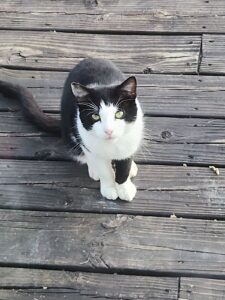Investor Winter: Lessons from Nature
 Ten months ago, a feral cat showed up in our backyard. He’s a young cat: Harry can’t be more than a few years old, doesn’t meow like felines who are raised by humans. A veterinarian member of the family told us it’s a sign that he’s been feral since birth.
Ten months ago, a feral cat showed up in our backyard. He’s a young cat: Harry can’t be more than a few years old, doesn’t meow like felines who are raised by humans. A veterinarian member of the family told us it’s a sign that he’s been feral since birth.
We have no idea where Harry calls home. When we first spotted him in Spring, we started leaving him food. Despite the fact that he’s shown up almost daily since, he hasn’t warmed up to us at all. He shows up for food at least twice a day – very early morning and evening – but always keeps his distance.
And won’t eat any processed food, mind you: he knows better. And hisses at us if – heaven forfend! – we don’t bugger off and give him his space while he’s dining.
We do remind him that he’s a feral cat and is lucky that we feed him. He has yet to take heed, and instead grabs the food and runs off. Or will sit in the yard – in a protected spot – and have his meal a safe distance from us and provided that we aren’t watching him.
Winter came and with it, snow. Harry didn’t come around when there was snow on the ground: he knows better than to leave paw prints that could attract predators.
There’s a reason why he has survived this long in the wild: good instincts.
There was a week where it had snowed, and the mercury hit single digits. Harry didn’t show up at all that week.
No paw prints in the snow. No Harry.
When it finally melted, not only did Harry show up: he was famished. He devoured the piece of chicken we’d put out for him, then demanded more, which we provided, and he grabbed it and ran off, only to show up shortly afterwards for more.
Again, we accommodated him.
He showed up three times a day over the next two days, devouring or running off with what amounted to an entire chicken and then some, this less-than-full-grown feline whom we’d never seen consume more than a chicken leg or two over the course of a day!
Being feral, Harry had strong natural instincts, no doubt sensed another snowstorm brewing and was preparing for it this time.
Sure enough, it snowed again, and we realized that Harry had taken most of that chicken and squirreled it away in his lair: he had saved it for that proverbial rainy day.
This is a lesson to founders. The tech sector is very much experiencing investor winter. The money is out there, but it’s harder to get to. Spray and pray never works, so if you believe that sending out a hundred pitch decks will surely get you funded – that one is bound to hit – rethink this: better to target/do a strategical strike on those investors who understand your space and are more likely to invest in you. It’s not a numbers game: it’s a strategy. It’s far more important to get to the right investor. If they happen to express interest, but aren’t yet ready to write the check, ask them for feedback. And stay in touch with them. Send them updates. Keep them in the loop. Regularly, meaning every four to six weeks. Don’t overdo it: stalking is never a good idea.
If you find a fund that invested in a technology that’s very similar to yours, do not pass go; do not collect $200. Chances are they’ll take the meeting to pick your brain – then share the information with their portfolio company. Never a good idea to put your superpower on their radar. As Harry well knows, always be aware of the predators out there.
And they’re out there, especially during an investor winter.
If perchance you do find some sustenance, re funding, don’t start hiring like mad, which is the classic founder mistake. Use the money wisely and cautiously, and like Harry, make sure to put some aside for when you really need it.
Although you may feel you want to be conservative with your ask, do make sure to ask for at least a bit more than what you’ve budgeted for. Startups always cost more than you think, and development takes longer than you planned.
The weather has been warming up, but it has still been a few days since we’ve seen Harry. Dollars to donuts, he’s still living off his stash and unlike many founders out there, knows better than to bite off more than he can chew.
Onward and forward.